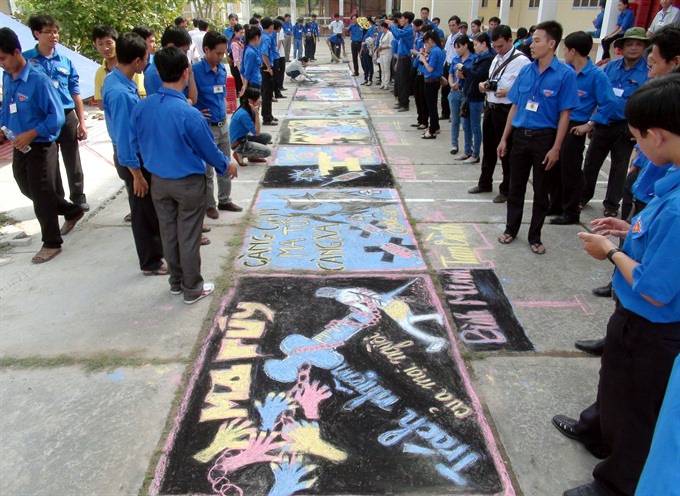 Politics & Law
Politics & Law

The amendment and supplement to Penal Code 2015 was put on the table yesterday at the National Assembly, with many deputies raising concerns on articles relating to juvenile offenders and drug trafficking criminals.
 |
| Young people in the southern province of Vĩnh Long join a drawing contest on drugs and HIV/AIDS prevention and control, which aims at contributing to reducing juvenile offenders and drug trafficking criminals. — VNA/VNS Photo Phạm Minh Tuấn |
HÀ NỘI – The amendment and supplement to Penal Code 2015 was put on the table yesterday at the National Assembly, with many deputies raising concerns on articles relating to juvenile offenders and drug trafficking criminals.
The Code, approved by the 13th NA late last year, was due to take effect at the beginning of July. However, its implementation, and that of some other related laws, was delayed after a string of errors, including regulations that could be unsuitable for reality, were discovered.
Some deputies yesterday suggested revising the current regulation, which provides penal liability exemption for juvenile offenders who commit what are considered less serious or serious crimes, in the context that criminals have become younger recently.
According to official estimates, there were more than 34,500 cases involving more than 59,600 juvenile offenders from 2011 to June 2015 across the country. In June 2016 alone, there were 2,082 cases with 3,669 juvenile offenders.
Deputy Nguyễn Văn Tuyết, vice chairman of NA Committee for Culture, Education, Youth and Children urged revisions to the regulation that juvenile offenders aged 14 to under 16 do not have to bear penal liability for crimes such as intentionally inflicting injury on or causing harm to the health of other persons, rape, and kidnapping in order to appropriate property.
He said these types of crimes committed by this group of offenders tended to increase recently, and thus imposing penal liability helped to “re-educate criminals and increase prevention and deterrence”.
Tuyết suggested upholding the regulation in Penal Code 1999, which requires those offenders to be subject to penal liability if their criminal acts are considered “very serious and being intentionally committed, or particularly serious” without naming the type of crimes.
Deputy Nguyễn Thị Phúc from Bình Thuận Province agreed with Tuyết.“Treating offenders humanely means we are inhumane to victims. Recently, there have been many particularly serious cases of inflicting serious injuries to others, causing direct and long-term impacts on victims and involving an increase of juvenile criminals,” she said.
However, deputy Tô Văn Tám from Kon Tum Province disagreed. He said the standpoint of treating juvenile offenders humanely had been consistently applied during the country’s law compiling process. It was also in line with international norms and conventions to which Việt Nam is a member. He agreed to uphold the current regulation, while suggested “increasing other types of punishment, such as sending offenders to rehabilitation or educational centres to prevent possible future criminal acts.”
Drug-related crimes
The handling of drug-related crimes was also high on the agenda.
According to statistics by the Ministry of Public Security, the number of drug addicts increased by 44,000 over the past five years.
Deputy Nguyễn Thị Thuỷ of Bắc Kạn Province disapproved with the regulation in the draft amendment of the Code about defining the content of narcotics extract, saying that it is inappropriate.
According to this regulation, authorities must carry out tests to specify the content of narcotics extract in five cases of drug-related crimes, such as cases in which offenders may face up to 20 year imprisonment, life sentences or death sentences, or cases where solid narcotic substances are dissolved into liquid. The weight or volume of narcotics will be calculated from the amount of extract and based on that, the authorities will define whether the crime is less serious, serious or particularly serious and impose punishments accordingly.
“Attacking drug-related criminals is to attack their intention of spreading peril on the whole society. When committing such crimes, the offenders do not care about the amount of narcotics extract. What they care about is the amount of drugs,” said Thuỷ, also an official of the Supreme People’s Procuracy.
“Narcotics extract is also not available in society. It is only available in laboratories or assessing centres,” she said.
Her opinion was shared by some deputies, who said that the regulation had caused difficulties and long delays to the investigation, prosecution and trial processes. They agreed to maintain the past regulation that the ruling in drug-related crimes is based on the amount of drug captured from criminals, not based on the amount of narcotics extract.
Overall adjustment
Yesterday’s discussion also heard different views from deputies on the overall adjustment and supplement of the Code.
Some deputies agreed that it was necessary to amend and supplement the 141 articles in the Code where the technical errors or regulations that are inappropriate or hard to implement have been detected. However, the amendment and supplement should refrain from effecting macro policies mentioned in the law that were approved by the former NA and should not try to seek new problems.
Meanwhile, the second view held that besides dealing with the detected problems, the NA should review and check the whole Code in order to ensure that there will not be any other errors. A total modification can also be carried out if necessary. – VNS




